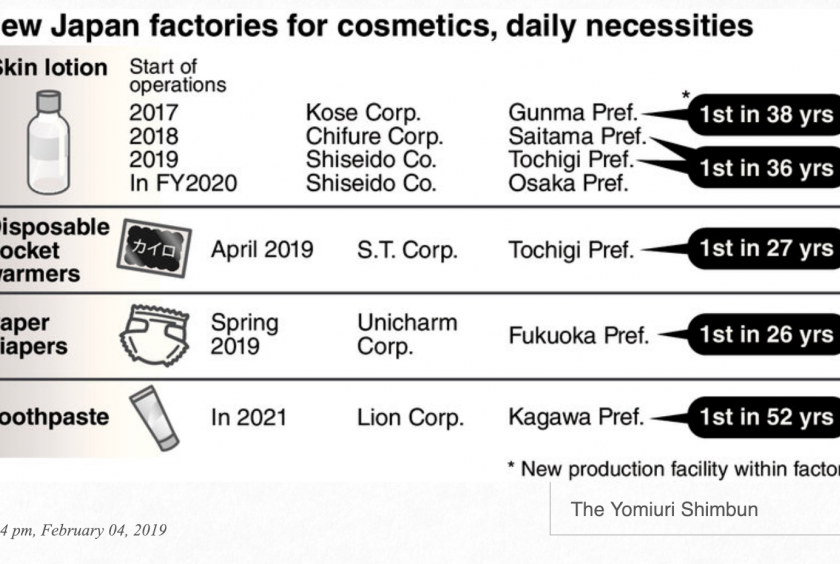
Tokyo (The Japan News) - Makers of Japanese cosmetics and various daily necessities are quickly increasing their domestic production capacity, as the rapid increase in foreign visitors has spurred an overseas boom for “Made in Japan” items.
Some Japanese companies are building domestic factories for the first time in decades. Lion Corp., for example, will start constructing a new toothpaste plant in Kagawa Prefecture this year, aiming to start operations in 2021.
It will be the first time in 52 years for a new toothpaste plant to be built in Japan. The new factory will increase the company’s production capacity by 70 percent, to address “the growing popularity of cavity-preventing toothpaste in China and Southeast Asia,” according to Lion’s public relations department.
Shiseido Co. will build and open its first domestic factory in 36 years in Tochigi Prefecture this year, and a new factory in Osaka Prefecture in fiscal 2020, to increase production of skin lotion and other products. Shiseido is seeing strong sales of its cosmetics in Asia.
S.T. Corp. and Unicharm Corp. will start production at their new domestic plants this spring.
The unit prices of cosmetics and daily necessities are lower than those of products such as automobiles, and manufacturers have long shifted their production bases overseas, believing it would be difficult to make a profit from exports due to the cost of transportation.
However, the number of visitors to Japan began increasing sharply in the 2010s, and so-called bakugai, or shopping sprees by tourists who buy daily necessities in bulk, became a turning point. Visitors who saw the high quality of Japan-made products continued to buy them online after returning home, in what is called “cross-boarder e-commerce.”
Many goods sold at retailers overseas or through online shopping are fake, so these shoppers apparently believe that buying Japan-made products ensures their quality.
“Japan-made products have now become a brand,” Mizuho Securities Co. senior analyst Wakako Sato said.
According to current production statistics, shipments of cosmetics from domestic factories reached a record high of about ¥1.6 trillion ($15 billion) in 2017. Exports also hit a record high for the fifth straight year, nearly tripling from five years ago.
Department store sales of cosmetics in Japan also increased from the same month a year earlier for the 45th consecutive month in December 2018. Such brisk sales have pushed manufacturers to return to domestic production.
However, Japanese companies are lagging behind their U.S. and European rivals, such as L’Oreal and Unilever, in the global market. Whether Japanese makers of consumer products can make the high quality of their products known throughout overseas markets, as has been done for automobiles, will be key to maintaining the expansion of domestic production.
http://the-japan-news.com/news/article/0005523163









